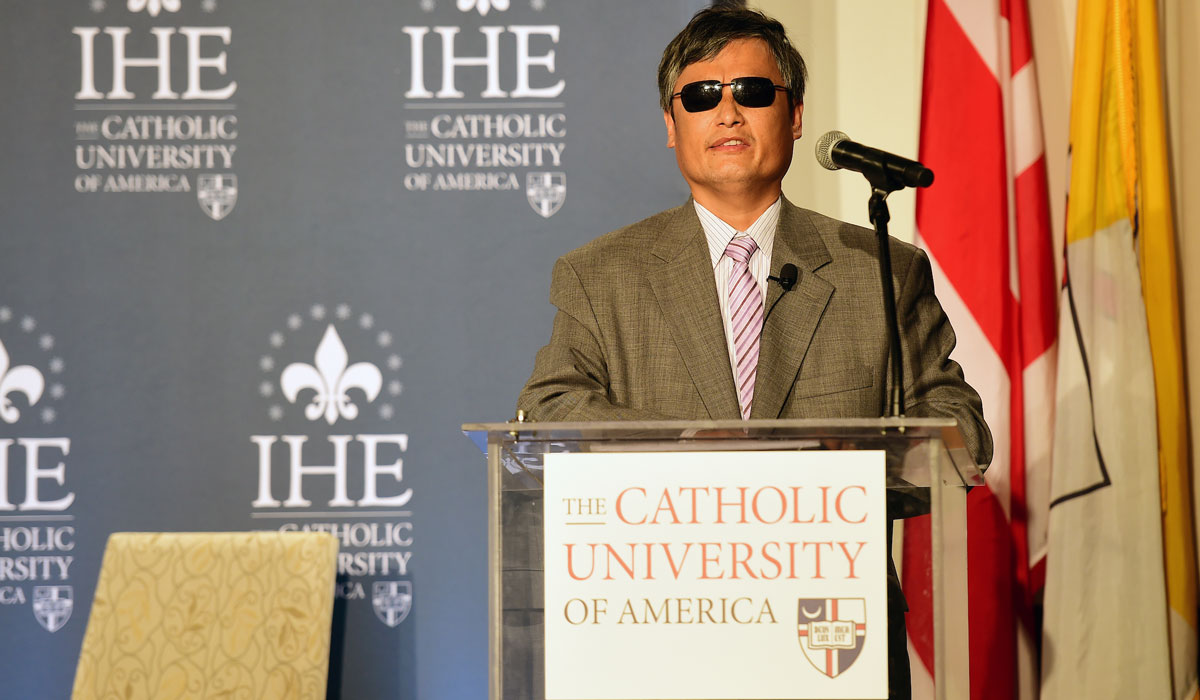

It’s been 30 years since the Tiananmen Square protest and massacre. So what has happened since then when it comes to human rights in China?
This question was at the forefront of a lecture hosted by the Institute of Human Ecology on Oct. 9 in Heritage Hall. The lecture, titled “Thirty Years After Tiananmen Square: Human Rights In China Today,” featured Chinese civil rights lawyer and activist, Chen Guangcheng, and was moderated by William Saunders, director of the University’s Center for Human Rights.
Saunders gave a quick history lesson for attendees then introduced Guangcheng by sharing his story and courageous journey on how he got to the U.S. by quoting from Guangcheng’s memoir, The Barefoot Lawyer.
“Guangcheng became blind as a young child due to an illness. He grew up among the rural poor surrounded by brutality and injustice on many levels by government officials. Over time Guangcheng became familiar with Chinese law and helped educate the farmers and villagers to their legal rights under the Chinese law. In 2015 Guangcheng uncovered the illegal one child policy forced abortions and was denounced by the CCP [Chinese Communist Party] and imprisoned for years and then returned home but placed under illegal house arrest. As recounted in the book, this man, blind, escaped,” said Saunders.
Following the introduction, Guangcheng shared his reflections and his own experience since the Tiananmen protests, and gave insight into the human rights issues still happening in China.
Guangcheng said, “in the early 2000s, many people like me started using law to protect people’s rights. This has been called the ‘Rights Defense Movement.’ The CCP responded with persecution.
“I am here today only because I escaped. But others have not been able to escape. On July 9, 2015, the CCP began detaining lawyers and activists across China.”
Guangcheng also explained how many ethnic and religious groups are also persecuted under the CCP. “Over one million Uhyigars have been placed in concentration camps. Over 150 Tibetans have self-immolated in protest of the treatment of their people. Christians are persecuted and Churches and crosses are torn down. Falun Gong’s are detained and tortured.”
To control the people of China, the CCP has installed massive surveillance networks. Guangcheng explained, “Inside China, there are over 200 million cameras around the country that uses facial and movement recognition to track people. Online, the authorities track comments, delete information, and shut down accounts.”
Guangcheng also showed his support for the people of Hong Kong, as they are currently protesting for their rights. “The Hong Kong people know the truth, which is why they have been protesting for over three months. They see that Beijing wants to control Hong Kong completely and take away freedoms, like freedom of speech, and freedom of the judiciary. I think the Hong Kong people will continue to fight and the U.S. government and the U.S. people should support Hong Kong."
Following Guangcheng’s lecture, Saunders asked Guangcheng a series of questions for attendees to get a closer look into how the Chinese Comnunist Party is affecting and controlling the everyday person and religious believers in China, as well as its influence outside of China.
“There is no rule of law, regular people cannot use the law to protect themselves. There is so much corruption, officials do bad things and are not punished,” said Guangcheng.
“The CCP’s efforts also have influence in demoractic countries, such as buying time on radio stations, putting up advertisements in places like Times Square, buying stock to influence media companies, and using Confucius Institutes to control what people say about China on American campuses,” he said.
Despite Guangcheng’s experience, he continues to fight for human rights in China and has great hope for the people of China. “I believe that what determines outcomes are people. As long as you have confidence and determination, and know that justice is on your side, and thirst for freedom, you will find the path to overcome your enemies. The quest for freedom is innate within all of us. As oppression grows, so does the will to fight back.
“The Chinese Communist Party is not the same as the Chinese people. I believe in the Chinese people. Only in China, our system is bad. This is what I want to change,” said Guangcheng.